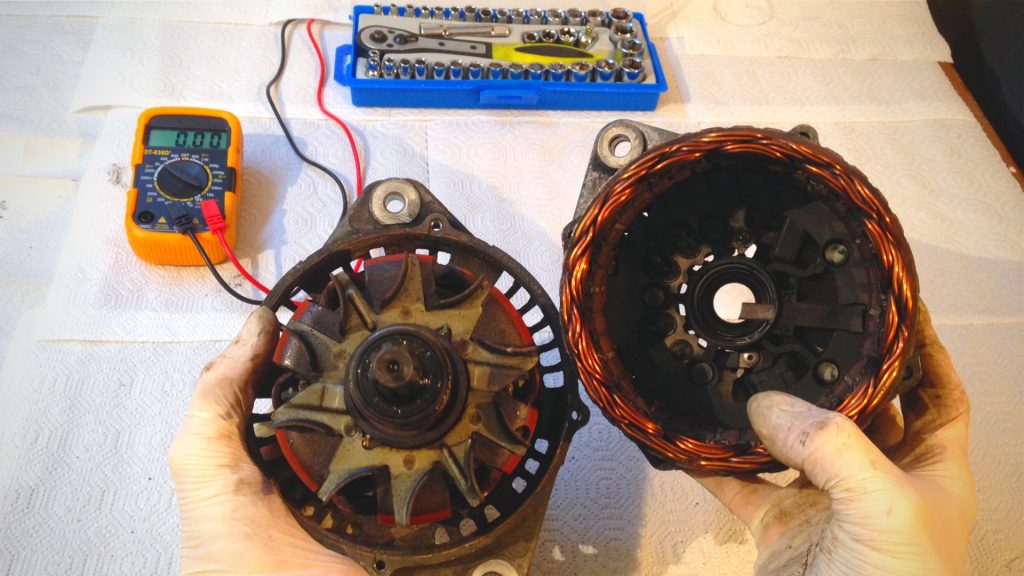
Alternator troubleshooting & repair might seem like a job to leave to the experts but in reality it is an easy DIY job! You can troubleshoot and repair faults with your car’s alternator with a basic tool kit and this post and video will show you how.
Often, alternators stop working due to a cheap and easy to replace component. Usually it is a problem with the diode plate or the voltage regulator. These components can be purchased on their own, so you can fix your alternator for $25, instead of having to spend a fortune on a whole replacement unit.
How do you know if your alternator has a problem?
Our alternator stopped working suddenly and as a result we lost the power steering and all our instruments, including the speedometer. (Cue a rather tense drive home…)
Once I got the car home I went through the following troubleshooting procedures. The only tool I used was a cheap digital multimeter:
Day 1
- Visual inspection of Auxiliary belt which drives the alternator: No problem seen.
- Check V-belt tension: Tension was good.
- Check all fuses: All fuses ok (Look out for fusible links too. These look like normal electrical cables but they can ‘blow’ like a fuse).
- Ensure alternator pulley functioning normally: Pulley good, clutch not slipping.
- Check battery voltage with engine off: 11.0 Volts DC = VERY flat. I removed the battery, charged it overnight, and then refitted it.
Day 2
- Check battery voltage with engine off [charged battery]: 12.6 Volts.
- Check battery voltage with engine running: 11.3 Volts = the alternator was not working at all.
- Check voltage drop by putting one probe on battery negative terminal and one on the aluminium alternator casing: Negligable voltage drop.
- Check voltage drop as above but with one probe on the large ‘B+’ terminal on the alternator, and the other probe on the positive post on the battery: Negligable voltage drop.
- Check voltage on both pins of alternator electrical plug: Voltage present on both pins.
After going through these troubleshooting procedures, and finding nothing wrong, the alternator itself seemed like the culprit.
This is what I had thought from the beginning. However, when fault-finding it always pays to start with the easy stuff first. Imagine taking your alternator off, finding no problem with it, and then eventually discovering that the problem had been nothing more than a blown fuse all along…
On many cars, it is possible to do some more tests on the alternator with it still on the car. Because of the incredibly awkward location of ours, this wasn’t possible. I needed to get much better access to the alternator…
How hard is it to remove an alternator?
Usually, easy. On my car, a complete pain in the derriere! As well as being right down at the bottom of the engine there was also an oil-driven brake servo vacuum pump attached to the alternator. What joy(!) On most cars, alternator removal is easy. Search YouTube and Google and you’ll almost certainly be able to find a write-up or video from someone who has done it on your particular car model.
The Alternator has been removed from the car… now what?
Well, the easiest way to anwer that question is for you to watch my video ‘Alternator Troubleshooting and Repair (with simple tools)’ below:
There we are then! Instead of forking out several hundred dollars for a brand new alternator, you can repair your own with a $25 part (this price includes shipping). It’s almost always a small component which goes unserviceable on an alternator, that’s why you can find lots of places where you can get a discount if you exchange your alternator… They will fix your unserviceable one and then it can be sold on as a working unit!
The alternator in the video is pretty much a worst case scenario as the electronics are often much more easily accessible than they are in this model. In other words, it may be much easier to fix your alternator problem, than with this Bosch model in the video…
Has this post given you the confidence to troubleshoot and repair your own alternator? Or has it put you off for life?! Do you have any feedback, comments feedback or suggestions?
Let me know in the comments section below!
I hope you found this post useful. If so, please share it on social media.
Cheers!
Chris 👍








Leave a Reply